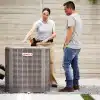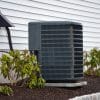
Are heat pumps noisy? In this article, we’ll explore the potential noise issues that can arise with heat pumps and share practical tips on how you can enjoy quieter heating and cooling.
Whether you’re considering heat pump installation or looking for ways to reduce noise from your existing system, we’re here to provide solutions that help you create a more peaceful indoor environment.
1. Are Heat Pumps Noisy?
Heat pumps are generally known for their quiet operation compared to traditional heating and cooling systems like furnaces and air conditioners. However, they do produce some level of noise during operation, which can vary depending on several factors such as the type of heat pump, its location, and the level of maintenance.
Heat pumps typically operate at sound levels ranging from 50 to 70 decibels, which is comparable to normal conversation or background noise in a residential area. However, some models may produce louder noises, especially if they are older or poorly maintained.
2. Why Does Your Heat Pump Create Noise?
Several components of a heat pump can contribute to noise generation:
Compressor Noise
The compressor is the heart of the heat pump, responsible for circulating refrigerant and facilitating heat exchange. While modern compressors are designed to operate quietly, certain issues such as worn bearings, loose components, or refrigerant leaks can lead to abnormal noises. Common compressor-related noises include humming, buzzing, or rattling sounds. Regular maintenance and prompt repairs can help address compressor-related issues and prevent further damage to the system.
Fan Noise
The outdoor unit of a heat pump contains a fan that helps dissipate heat during the cooling cycle and draws in outdoor air during the heating cycle. Over time, the fan blades may become misaligned, or debris such as leaves, twigs, or dirt may accumulate around the fan, causing it to produce excessive noise. Regular cleaning and inspection of the outdoor unit can help prevent fan-related noise issues.
Airflow Noise
Airflow through the ductwork and vents can also contribute to noise generation, especially if there are restrictions or blockages in the system. Common airflow-related noises include whistling, hissing, or whooshing sounds, which may indicate issues such as duct leaks, improper duct sizing, or blocked vents. Sealing duct leaks, ensuring proper duct sizing, and maintaining clean and unobstructed vents can help reduce airflow-related noise and improve the overall efficiency of the system.
To help you understand where the noise might be coming from, we’ll also outline some common myths about heat pump noise.
Myth – All Heat Pumps Are Noisy
While it’s true that some older or poorly maintained heat pumps may produce excessive noise, modern heat pump models are designed to operate quietly. Advances in technology, such as variable-speed compressors and sound-dampening features, have significantly reduced noise levels in newer heat pump models. With proper installation and maintenance, homeowners can enjoy efficient and quiet operation from their heat pump systems.
Myth – Heat Pump Noise Is Unavoidable
While some level of noise is inherent in any mechanical system, excessive noise from a heat pump is often a symptom of underlying issues such as improper installation, lack of maintenance, or component failure. By addressing these issues promptly and implementing soundproofing measures, homeowners can significantly reduce noise levels and enjoy a quieter indoor environment.
It’s essential to understand the different types of noise your heat pump may produce and their potential causes. For example, rattling or clanking sounds could indicate loose components or debris in the system, while a high-pitched squealing noise may suggest a motor issue.
Tips for a Quieter Heating and Cooling System
Select a High-Quality HVAC System:
Investing in a high-quality heat pump from a reputable manufacturer can help minimize noise issues. Look for models with advanced features such as:
Variable-Speed Compressors: Variable-speed compressors adjust their speed based on the heating or cooling demands of your home, resulting in quieter operation compared to single-speed compressors.
Sound-Dampening Technology: Some heat pumps are equipped with sound-dampening features, such as insulated compressor compartments and vibration-reducing mounts, to minimize noise during operation.
Ensure Proper Installation and Maintenance:
Proper installation and regular maintenance are crucial for optimizing the performance and reducing noise from your heat pump. Here are some key considerations:
Professional Installation: Hire a qualified HVAC technician to install the system correctly and ensure all components are properly aligned and secured. Improper installation can lead to vibration, rattling, or other noise issues.
Regular Maintenance: Schedule annual maintenance checks to clean filters, lubricate moving parts, and identify any potential issues before they escalate. Dirty or worn-out components can cause increased friction and noise during operation.
Use Insulation Measures:
Implementing insulation measures can help further reduce noise from your heat pump.
Ensure that your home is properly insulated to minimize heat loss or gain, reducing the need for the heat pump to operate at higher speeds, which can increase noise levels. Insulate ductwork to prevent air leaks and minimize airflow noise.
Conclusion
In conclusion, understanding and addressing heat pump noise is essential for creating a peaceful home environment. By following the tips and strategies outlined in this guide, you can enjoy the benefits of efficient heating and cooling without the disturbance of excessive noise. Achieving quieter comfort is within reach for every homeowner.




